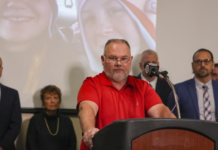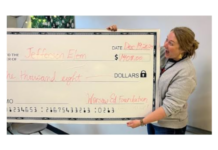FORT WAYNE (AP) — At the Allen County Public Library’s Genealogy Center on Tuesday morning, Nicka Smith shared some of her family’s history.
Yes, she says, she’s traced some family roots back to Cameroon in Africa – and she’s even taken a trip there to see places her ancestors lived.
But, by using DNA testing, she’s also had some surprises – specifically, that some of her ancestors were European.
In other words, white.
Tuesday, during the first day of a three-day conference of the Midwest African American Genealogy Institute at the library in downtown Fort Wayne, Smith taught some of the basics of new DNA technology tools she believes could shape the future of race relations in America.
“I really call DNA the great equalizer,” said Smith, a professional genealogy researcher from Memphis, Tennessee. “I think people are realizing that we are mixed-race people.”
With that realization, she believes, prejudices could begin to fade away. Because people can’t control the circumstances of the families into which they’re born, genealogy, bolstered by DNA results, can bring people back to a basic level of shared humanity.
“In my opinion, it’s one of the only things in life that can do what it does,” Smith said in a genealogy blog she writes atwww.whoisnickasmith.com.
Indeed, black family researchers are so interested in the potential of DNA testing that Smith’s seminar filled up – with people crouched over laptops trying to make sense of their familial data. About 60 people were registered for the conference, which continues until Thursday.
Bernice Bennett of Silver Spring, Maryland, another conference instructor, said it was the first time to her knowledge that black instructors had taught a class full of other African-Americans.
“Usually, when I present a seminar about African-American genetics, they are in the minority in the class,” she said.
For Smith, the recognition that she had white ancestry came through DNA testing of herself, her mother and her maternal grandmother, who died at age 100 earlier this year.
Her mother’s DNA showed a substantial portion of European ancestry. Smith later learned that her mother’s father and grandfather were the source.
Ironically, her grandfather, “if he was checking boxes (on a census form), he’d be checking African-American,” said Smith, who keeps pictures of the two men, who look remarkably alike, on her smartphone.
Finding white ancestors “is not unusual,” she said. Indeed, some men who identify as black might not even have a genetic marker that would identify them as being from Africa because it is inherited paternally, and there were white male ancestors in their line.
Smith said she had other surprises – that she also had American Indian ancestry and that she also was a cousin of a white genealogy researcher she knew.
For Shawn Christmas of Washington, D.C., another instructor, DNA evidence proved troubling. He found he was descended from a white man, Sir John Hawkins, a 16th-century British admiral who was instrumental in getting the British involved in the slave trade.
“So he was partly responsible” for the proliferation of slaves in the New World, Christmas said.
Conference attendee Noreen Goodson of Baltimore, Maryland, who has had her DNA tested, said she found that nearly 80 percent of her ancestry was African. But 20 percent was European, she said, apparently on both sides of her family.
“It doesn’t matter to me where it comes up,” she said. “We’re all mixed up.”





